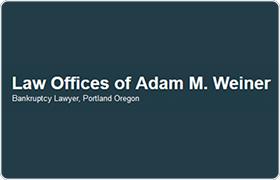Portland Collection Lawyer, Oregon
Sponsored Law Firm
-
 x
x

Click For More Info:
-
Law Offices of Adam M. Weiner
8624 SE 13th Ave Portland, OR 97202» view mapBankruptcy & Debt Premier Bankruptcy Attorney
Life doesn’t always have to be hard. Consult with a bankruptcy attorney who looks out for your best interests. Call today to begin the process for a fresh financial start.
503-719-5123
Adam M. Weiner
✓ VERIFIEDBankruptcy & Debt, Credit & Debt, Collection
Adam Weiner has been practicing law in Oregon since May 1998. After successfully spending many years representing individuals in different types of... (more)
Pamela E. Yee
Real Estate, Business Organization, Credit & Debt, Collection
Status: In Good Standing Licensed: 37 Years
Scott Jandon Mitchell
Bankruptcy, Litigation, Collection, Credit & Debt
Status: In Good Standing Licensed: 13 Years
Jennifer Marie Mcdonald
Litigation, Collection, Bankruptcy & Debt
Status: Suspended Licensed: 11 Years
Courtney Allen Cross
Federal, Credit & Debt, Collection, Bankruptcy & Debt
Status: In Good Standing Licensed: 30 Years
Miles D Monson
Other, Credit & Debt, Collection, Bankruptcy
Status: In Good Standing Licensed: 32 Years
Kathryn A. Hall
Agriculture, Contract, Collection, Animal Bite
Status: In Good Standing Licensed: 21 Years
 Adam M. Weiner Portland, OR
Adam M. Weiner Portland, OR Practice AreasExpertise
Practice AreasExpertise

